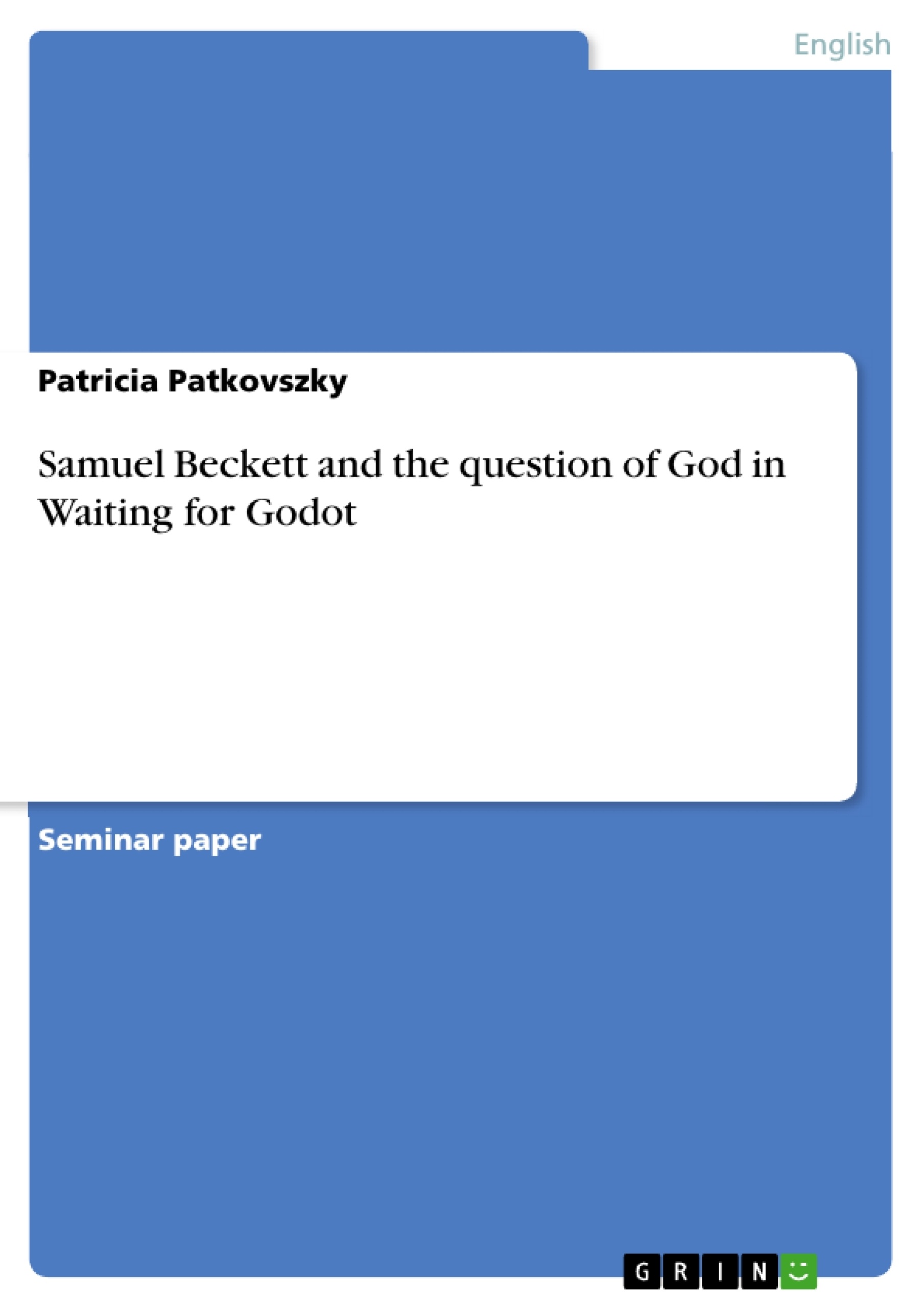Excerpt
Contents
1. Foreword
2. Beckett's religious background
3. Religious Motives in Waiting for Godot
3.1 The four Evangelists
3.2 Lucky's monologue
4. Is Godot God?
5. Conclusion
6. Bibliography
1. Foreword
Harre des HERRN! Sei getrost und unverzagt und harre des HERRN![1]
(Psalms 27,14)
On 5 January 1953 Waiting for Godot challenged its first theaters audience with a never seen dramatic work of art, radically different from anything shown before, the title “referring ironically to the nonappearance of the person awaited so faithfully by the two main protagonists”. (Astro 114)
Before Beckett, drama was synonymous with action: a plot in which barely anything happens was inconceivable. Beckett is the first dramatist to focus exclusively on the act of waiting and to make this into his dominant metaphor for existence. He, at he same time, expects his audience to share that experience of waiting with Estragon and Vladimir. As Martin Esslin pointed out in 1961: “Beckett is trying to capture the basic experience of being 'in the world', having been thrust into it without a by-your-leave, and having, somehow, to come to terms with 'being there', 'Dasein' itself, in Heidegger's sense“. (quoted in Bradby 25)
Vladimir and Estragon, two tramps, are the main characters of the play. They perform on an empty stage, marked only by a single tree and a low mound, waiting for the appearance of a mysterious character named Godot. Two other men, Pozzo and Lucky, master and servant, turn up and stay with them for a while. To pass their time, they discuss their bodily handicaps, their non-fitting clothes and episodes of their life together as well as questions of theology. Godot, however, never comes; but a boy delivers the message, that he will be there the next day. Vladimir and Estragon consider leaving and even committing suicide, but they fail in doing so. Nearly the same events take place during the second act. Godot never comes and the story kind of repeats itself.
It becomes clear that they will wait for his appearance. For how long? No one knows. Prozzo and Lucky return, they seem familiar, but they do not recognize each other. They wait and forget, even almost forget why they are waiting. Vladimir has to remind Estragon why they are not leaving: “We're waiting for Godot” (Beckett 4), repeating it over and over again, and so almost turning the sentence into a mantra of no sense. The act of waiting as an end in itself, the target almost forgotten, minute after minute like an endless anguish. They live in world of no sense, with only the painful hope of waiting. Of waiting for Godot. He must come, so he has promised. But when? And is this the right day, the right place? How can they be sure of anything, including their own identity?
Not being sure of anything, they lapse into verbal and physical routines just to fill the silence and to ward off their fear of the void, and as Estragon says: “to give us the impression we exist”. (Beckett 21)
Since the first performance of the play people have asked themselves: Who is Godot? Why wait for him? Why is there a Waiting for Godot ? Godot... Godot... Is Godot hope? Life? A new beginning? Or death and salvation? Or is he maybe God himself? And then why does he not come? Is God dead? Lies the real catastrophe in his promise?
Surely the name Godot hints the allegory that the letters of Godot are the diminutive form of God. And the play is full of allusions to the bible. Critics have always sought to identify religious, spiritual and mystical underpinnings within Beckett's writing.
My work therefore shall have a short look at Beckett's religious background, his relationship with religion and god; as well as the religious motives in Waiting for Godot and the question of whether Godot is God or not.
2. Beckett's religious background
Samuel Beckett was born near Dublin, Ireland, on April 13,1906. His early upbringing and religious development was marked by his mother who had strong values of piety and discipline. At the same time his growing up in a well-to-do Protestant minority in Dublin, where all neighbors were predominantly Protestant, together with him being Irish, as Mary Bryden points out, have contributed to his religious awareness. (Oppenheim 155)
In his A Reader's Guide to Samuel Beckett, Hugh Kenner states that “Beckett's work draws on two spiritual traditions by which history has shaped the specifically Protestant character: the personal testimony, and the issueless confrontation with conscience. [...] Beckett's endlessly self-questioning protagonists share a habit of mind that since the seventeenth century has received a specific religious shaping, [...] mainly a system of punishments and rewards, with the Bible as the principal source of authority”. (Kenner 134)
Beckett's knowledge of the Bible, as seen for instance in Waiting for Godot, surely was remarkable. As we know from Anthony Cronin, Beckett “always possessed a Bible, at the end more than one edition, and Bible concordances were always among the reference books on his shelves. He certainly knew the book backwards and as a boy he won a prize for knowing it in the diocesan synod examination”. (Cronin 21)
All biblical quotes from the Good News Bible. The Bible Societies. Stonehill Green, 1976.
[...]
[1] „Trust in the LORD. Have faith, do not despair. Trust in the LORD.“
- Quote paper
- Patricia Patkovszky (Author), 2006, Samuel Beckett and the question of God in Waiting for Godot , Munich, GRIN Verlag, https://www.grin.com/document/62307
Publish now - it's free






















Comments